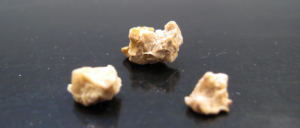
Kidney stones are not only incredibly painful, but are also associated with chronic kidney disease, osteoporosis, and heart disease. New research suggests a good way to prevent a recurrence of kidney stones is to increase consumption of calcium and potassium rich foods. Very simple!
The Mayo Clinic researchers also found certain dietary factors associated with a higher risk of getting kidney stones for the first time. They are: lower consumption of calcium, potassium, caffeine (e.g., coffee, tea), and phytate in the diet. As well as a lower daily fluid intake. Foods matter!
Some foods to eat to lower the risk of kidney stones:
Calcium rich foods: dairy products (e.g., cheese, milk, yogurt), dark green leafy vegetables (e.g., spinach, collard greens, broccoli, kale), and sardines. [Note: Calcium supplements are associated with kidney stones, while eating calcium rich foods is protective.]
Potassium rich foods: include legumes (beans and lentils), potatoes (with skins), tomatoes, some fruits (e.g., bananas, kiwi, orange juice, melons), dairy foods, some seafood (e.g., salmon, halibut, tuna, shad, clams), leafy greens (e.g., spinach), yam, squash.
Phytate rich foods: include beans, legumes, unprocessed cereal grains (e.g., oats), nuts, seeds, and potatoes. Some people have referred to phytate rich foods as "anti-nutrients" and say to avoid them (because they may slow down absorption of certain minerals). However, recent research finds that the health benefits of eating phytate rich foods (e.g., they are antioxidants, anti-inflammatory) and other plant foods outweighs any concerns.
From Science Daily: Diets higher in calcium and potassium may help prevent recurrent symptomatic kidney stones
Kidney stones can cause not only excruciating pain but also are associated with chronic kidney disease, osteoporosis and cardiovascular disease. If you've experienced a kidney stone once, you have a 30% chance of having another kidney stone within five years. ...continue reading "Certain Foods Lower the Risk of Kidney Stones"

 Another large recent study found that lowering sodium intakes (less than 2500 milligrams per day) wasn't linked to lower blood pressure. Over the course of 16 years, the researchers found that the study participants who consumed less than 2500 milligrams of sodium a day had higher blood pressure than participants who consumed higher amounts of sodium. However, the current 2015-2020 Dietary Guidelines for Americans recommends limiting sodium intake to 2,300 grams a day for healthy people. The researchers felt that based on recent studies with similar findings that the
Another large recent study found that lowering sodium intakes (less than 2500 milligrams per day) wasn't linked to lower blood pressure. Over the course of 16 years, the researchers found that the study participants who consumed less than 2500 milligrams of sodium a day had higher blood pressure than participants who consumed higher amounts of sodium. However, the current 2015-2020 Dietary Guidelines for Americans recommends limiting sodium intake to 2,300 grams a day for healthy people. The researchers felt that based on recent studies with similar findings that the  A banana a day keeps the doctor away? A recent
A banana a day keeps the doctor away? A recent